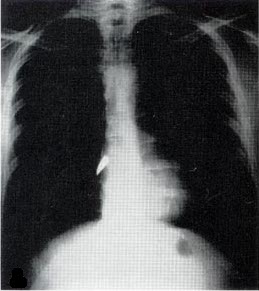Penetrating trauma
(Redirected from Penetrating injury)
Editor-In-Chief: Prab R Tumpati, MD
Obesity, Sleep & Internal medicine
Founder, WikiMD Wellnesspedia &
W8MD medical weight loss NYC and sleep center NYC
| Penetrating trauma | |
|---|---|

| |
| Synonyms | |
| Pronounce | N/A |
| Specialty | N/A |
| Symptoms | Bleeding, pain, shock |
| Complications | Infection, organ damage, hemorrhage |
| Onset | Sudden |
| Duration | Variable |
| Types | N/A |
| Causes | Gunshot wound, stab wound, impalement |
| Risks | Hemorrhagic shock, sepsis, organ failure |
| Diagnosis | Physical examination, imaging studies (X-ray, CT scan) |
| Differential diagnosis | Blunt trauma, contusion, abrasion |
| Prevention | Safety measures, protective gear |
| Treatment | Surgery, blood transfusion, antibiotics |
| Medication | N/A |
| Prognosis | Depends on severity and location |
| Frequency | Common in urban areas, varies by region |
| Deaths | N/A |
Penetrating trauma is a form of trauma in which an object makes contact with the body, piercing the skin and entering the body. This can cause serious injury to internal organs and structures, and is a common cause of mortality and morbidity worldwide.
Causes[edit | edit source]
Penetrating trauma can be caused by a variety of objects, including knifes, bullets, and other sharp objects. The severity of the injury depends on the object's speed, size, and the location of the injury. High-speed objects, such as bullets, can cause more damage than slower objects.
Diagnosis[edit | edit source]
Diagnosis of penetrating trauma involves a physical examination and imaging tests. The Focused Assessment with Sonography for Trauma (FAST) is often used to assess for internal injuries. Other tests may include CT scans and X-rays.
Treatment[edit | edit source]
Treatment for penetrating trauma depends on the severity and location of the injury. It may involve surgery, wound care, and antibiotics to prevent infection. In severe cases, emergency medical intervention may be required.
See also[edit | edit source]
References[edit | edit source]
Search WikiMD
Ad.Tired of being Overweight? Try W8MD's physician weight loss program.
Semaglutide (Ozempic / Wegovy and Tirzepatide (Mounjaro / Zepbound) available.
Advertise on WikiMD
|
WikiMD's Wellness Encyclopedia |
| Let Food Be Thy Medicine Medicine Thy Food - Hippocrates |
Translate this page: - East Asian
中文,
日本,
한국어,
South Asian
हिन्दी,
தமிழ்,
తెలుగు,
Urdu,
ಕನ್ನಡ,
Southeast Asian
Indonesian,
Vietnamese,
Thai,
မြန်မာဘာသာ,
বাংলা
European
español,
Deutsch,
français,
Greek,
português do Brasil,
polski,
română,
русский,
Nederlands,
norsk,
svenska,
suomi,
Italian
Middle Eastern & African
عربى,
Turkish,
Persian,
Hebrew,
Afrikaans,
isiZulu,
Kiswahili,
Other
Bulgarian,
Hungarian,
Czech,
Swedish,
മലയാളം,
मराठी,
ਪੰਜਾਬੀ,
ગુજરાતી,
Portuguese,
Ukrainian
Medical Disclaimer: WikiMD is not a substitute for professional medical advice. The information on WikiMD is provided as an information resource only, may be incorrect, outdated or misleading, and is not to be used or relied on for any diagnostic or treatment purposes. Please consult your health care provider before making any healthcare decisions or for guidance about a specific medical condition. WikiMD expressly disclaims responsibility, and shall have no liability, for any damages, loss, injury, or liability whatsoever suffered as a result of your reliance on the information contained in this site. By visiting this site you agree to the foregoing terms and conditions, which may from time to time be changed or supplemented by WikiMD. If you do not agree to the foregoing terms and conditions, you should not enter or use this site. See full disclaimer.
Credits:Most images are courtesy of Wikimedia commons, and templates, categories Wikipedia, licensed under CC BY SA or similar.
Contributors: Prab R. Tumpati, MD




